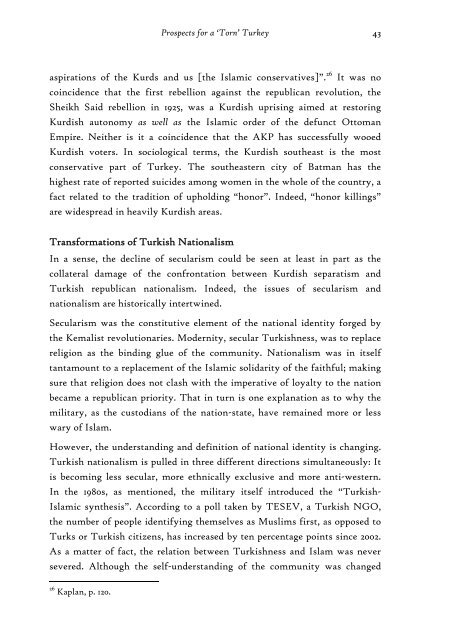2008_10_SRP_CornellKaraveli_Turkey
2008_10_SRP_CornellKaraveli_Turkey
2008_10_SRP_CornellKaraveli_Turkey
Create successful ePaper yourself
Turn your PDF publications into a flip-book with our unique Google optimized e-Paper software.
Prospects for a ‘Torn’ <strong>Turkey</strong> 43<br />
aspirations of the Kurds and us [the Islamic conservatives]”. 26 It was no<br />
coincidence that the first rebellion against the republican revolution, the<br />
Sheikh Said rebellion in 1925, was a Kurdish uprising aimed at restoring<br />
Kurdish autonomy as well as the Islamic order of the defunct Ottoman<br />
Empire. Neither is it a coincidence that the AKP has successfully wooed<br />
Kurdish voters. In sociological terms, the Kurdish southeast is the most<br />
conservative part of <strong>Turkey</strong>. The southeastern city of Batman has the<br />
highest rate of reported suicides among women in the whole of the country, a<br />
fact related to the tradition of upholding “honor”. Indeed, “honor killings”<br />
are widespread in heavily Kurdish areas.<br />
Transformations of Turkish Nationalism<br />
In a sense, the decline of secularism could be seen at least in part as the<br />
collateral damage of the confrontation between Kurdish separatism and<br />
Turkish republican nationalism. Indeed, the issues of secularism and<br />
nationalism are historically intertwined.<br />
Secularism was the constitutive element of the national identity forged by<br />
the Kemalist revolutionaries. Modernity, secular Turkishness, was to replace<br />
religion as the binding glue of the community. Nationalism was in itself<br />
tantamount to a replacement of the Islamic solidarity of the faithful; making<br />
sure that religion does not clash with the imperative of loyalty to the nation<br />
became a republican priority. That in turn is one explanation as to why the<br />
military, as the custodians of the nation-state, have remained more or less<br />
wary of Islam.<br />
However, the understanding and definition of national identity is changing.<br />
Turkish nationalism is pulled in three different directions simultaneously: It<br />
is becoming less secular, more ethnically exclusive and more anti-western.<br />
In the 1980s, as mentioned, the military itself introduced the “Turkish-<br />
Islamic synthesis”. According to a poll taken by TESEV, a Turkish NGO,<br />
the number of people identifying themselves as Muslims first, as opposed to<br />
Turks or Turkish citizens, has increased by ten percentage points since 2002.<br />
As a matter of fact, the relation between Turkishness and Islam was never<br />
severed. Although the self-understanding of the community was changed<br />
26 Kaplan, p. 120.


